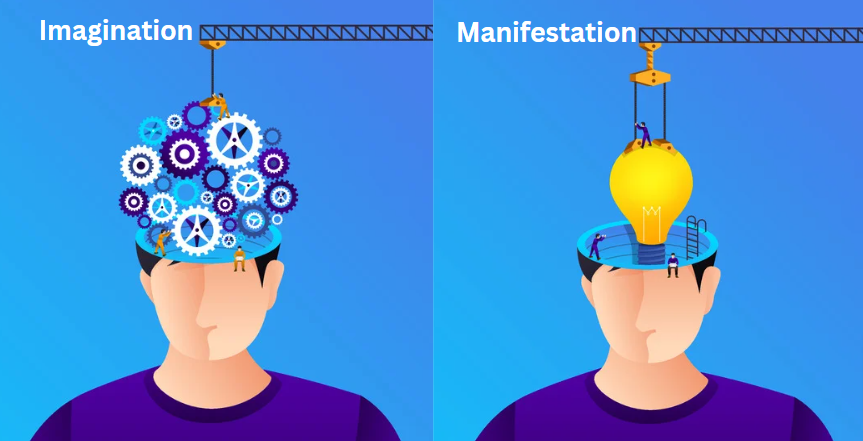 Both “imagination” and “manifestation” are important concepts in the realms of psychology, personal development, and metaphysics.
Both “imagination” and “manifestation” are important concepts in the realms of psychology, personal development, and metaphysics.
1. Definitions:
Imagination: The act or power of forming a mental image of something not present to the senses or never before wholly perceived in reality. It’s a creative force of the mind, allowing individuals to visualize, conceptualize, and think beyond their immediate reality.
Manifestation: This is the tangible or visible appearance of something, especially as a result of a process, intention, or creation. In spiritual or personal development contexts, manifestation refers to the practice or belief that thoughts, intentions, and beliefs can create or bring about real-world outcomes or changes in one’s life.
2. Process vs. Outcome:
Imagination: It’s primarily a process. It’s the action of the mind visualizing or conceptualizing ideas, scenarios, or desires.
Manifestation: It’s more about the outcome. It is the result of thoughts, intentions, or actions coming to fruition in the physical or experiential realm.
3. Scope:
Imagination: Infinite in scope. You can imagine anything, from dragons flying in the sky to living in a different universe. There are no boundaries to what the mind can envision.
Manifestation: Typically bounded by what’s perceived as possible or achievable, especially within spiritual or personal development contexts. For instance, one might manifest a new job, better health, or a relationship but not necessarily a fictional creature from their imagination.
4. Utility:
Imagination: Can be used for a range of purposes from problem-solving and artistic creation to daydreaming and entertainment. It’s a foundational component of human creativity.
Manifestation: Often used for personal or spiritual growth, achieving goals, or making desired changes in one’s life. It’s about realizing and bringing about particular intentions or desires.
5. Relationship Between the Two:
The process of manifestation often begins with imagination. Before one can manifest a desired outcome, one must first be able to imagine or visualize it. Imagination is the seed, and manifestation can be the fruit. For instance, an inventor imagines a new device, and then through effort and intention, this device is manifested as a tangible product.
In summary, while imagination pertains to the mind’s ability to conceive and visualize ideas or scenarios, manifestation is about those ideas or desires becoming tangible or realized in some form. In many spiritual or personal growth philosophies, imagination is seen as the starting point or precursor to manifestation.

